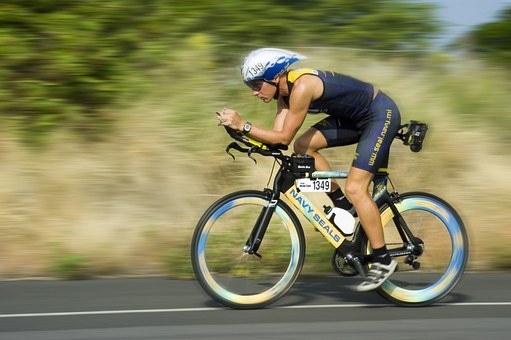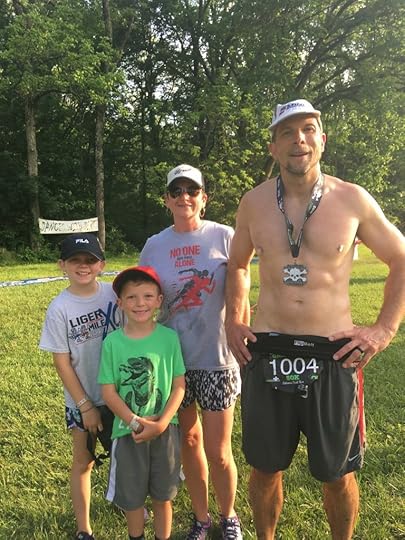Rob Bell's Blog, page 15
August 31, 2018
Three Tested Ways to Dig Deep and Overcome

Three Tested Ways to Dig Deep And Overcome
Every single morning when I wake, an awful thing happens. The very first voice is an attack on myself and it says ” you’re not running/swimming/biking this morning!”
The very first voice of the day.
Do you ever have that type of negative voice pop up?
Early on in life, before mental toughness, that negative voice won. It was a wide path that led to hard drinking!
Nowadays, I mostly win this battle, because my routine and plan and goals of an Ironman, but it’s still there nonetheless. We can’t magically get rid of the adversity, struggle, or hardships. If you want to change your situation, we have to dig deep and overcome!
Here’s three tested ways to dig deep and overcome.
1. Accept it and move on!
I was at a middle school dance when I finally summoned up the courage to ask this older 8th grader to dance. We’ve all had those tense moments!
Besides, I was told early on in life that the worse answer you can get is “NO.”
That is BS!
See, when I finally walked over and asked her to dance, she said something like “oh that’s sweet, let me get back to you.” Maybe she even patted me on the back or head, I can’t recall.
Well, I scurried back to my spot at the gym and eagerly awaited my dance. I was excited, because I had heard a “yes” NOT an “I’ll think it over.” But, I was stuck inside of my own head. I couldn’t ask anyone else and maybe, just maybe, she really did want to dance.
Then, after a few more slow songs, it was evidently clear that it was not going to happen. Then, the dance was over.
I learned “let me think it over ” is the worst answer I can get. A NO would have been more painful at the beginning, but we can accept it and move on.
Acceptance is the key to all of our problems.
I was fired by my professional golfer weeks after spending the entire week at The Masters. It tore me up, because I was fired after I did a good job! I was embarrassed and heartsick. It took me months to get over actually.
During that time, I didn’t progress, I got worse because I never accepted it and moved on.
When we let go of it, it lets go of us!
When we let go of it, it lets go of us!
Click To Tweet
We have to let go of the anger, resentments, and other people’s expectations.
Spoiler alert: Bad stuff is going to happen, life is unfair. So, can you accept it and move on, or do you stay bitter and not get better.
2. Do what is hard and life becomes easier. Do what is easy, and life stays hard.
Our mind has one job, to keep us safe and out of pain.
It’s one reason why the negative voice in our head exists. It’s not focused on making you better, it just wants the path of least resistance!
We all seek comfort in life. The scene of relaxing on a beach with an umbrella drink is glamorized, more so than showing someone chopping wood. It’s more comfortable and relaxing to be on the beach.
But, when we ALWAYS seek comfort, it actually makes life hard.
We have to seek ways to push ourselves in all areas of our life. Check out our article on 4 reminders to build mental toughness .
The best way is to push yourself in all areas by incorporating the JUST ONE MORE strategy.
3. When it’s all said and done, more is said than done!
EVERYTHING in life is easier said than done.
It’s easier to sit and watch TV than it is to exercise.
It is easier to go for a jog than it is to do wind sprints.
It’s easier to practice than it is to compete.
It is easier to NOT push ourselves than it is to push it. It’s simply easier to go through the motions.
Jon Morrow is a quadriplegic, and one of the most successful bloggers on the planet. He had to overcome massive challenges. Speech recognition software has enabled him to write articles read by more than 5 million people. He’s become a multi-millionaire, but more importantly has helped thousands of people dig deep and overcome themselves! Here is the article by Jon I recommend 7 Life Lessons From A Guy Who can’t Move Anything But His Face! His toughness and ability to persevere has stemmed from living out his beliefs, his actions!
We All have an ACE card up our sleeve- A.C.E.- Action Changes Everything!
James Lawrence (The Iron Cowboy) Summed up perfectly in this 30 second clip from his documentary about 50 Ironmans in 50 states in 50 days.
FIGHT!!!

Dr. Rob Bell is a Sport Psychology Coach. His company DRB & associates is based in Indianapolis. Some clients have included: Indy Eleven, University of Notre Dame, Marriott, and Walgreens. Check out all the books on Mental Toughness. Please check out the podcast 15 Minutes of Mental Toughness as we interview expert athletes and coaches about Mental Toughness and their Hinge Moment.
August 24, 2018
Mental Toughness Is Really About This…
[image error]
Mental Toughness Is Really About This…
I recently caddied an LPGA event for Maddie Sheils. She’s such a great person and golfer. It was fun! I’ve caddied over twenty web.com tour events and a handful of PGA events for my players, but it was my first on the ladies tour.
I re-learned that Mental Toughness is really about this one thing.
Now, on the men’s tour, there are a few golfers who get the attention of their fellow peers because really bomb it off the tee. But, there are 109 players on tour who average over 300 yards. So, the discrepancy isn’t too significant.
However, On the LPGA, the average driving distance is about 255 yards, so there’s a handful that “send it” off the tee about 270 and 280. The difference between 255 and 280 is massive. It’s a different game altogether.
Here’s my point!
Mental Toughness is really about how we respond to adversity.
So when a professional player who is top 10 in driving distance and can play well around the greens stumbles after playing really well, one thing becomes glaring. When they made mistakes during the tournament, they could not rebound or bounce back. They did not respond well to adversity and they finished way worse than they should have.
In our own lives, bad stuff is going to happen! We are going to have bad breaks, we are going to mess up, make mistakes, get upset, get down, frustrated. It’s not a matter of IF, but WHEN these will happen.
But, this isn’t some fall down 8, get up 9 cliche’ or when life hands you lemons make lemonade cute saying. This type of mental toughness is not about a grand big picture of life where you can assess what’s working and what’s not, cost/benefit analysis, bring in a consultant type of adversity. There’s not a lot of reflection time when it comes to having this type of mental toughness.
Adversity is sneaky!
This type of adversity and struggle is going to happen during the course of a match, meet, game, and life. It’ll occur very quick, and there are emotions and expectations involved.
But, I believe that the better we get at overcoming adversity during the difficult times, it will also help us during the good times.
Here’s Four Ways To Respond to Adversity
Awareness
Some of us can witness our emotional reaction to stress and bad stuff. Many of us can not see the build up and slowly it stacks up like pancakes before toppling over. We have to understand and know our major adversity triggers. Mine is simply misplacing and losing things. I hate it and I allow it to consume me sometimes.
Hope is NOT a Strategy
Luke Tyburski completed one of the most amazing physical feats ever, called the ultimate triathlon. He talked about it on my podcast and you can listen to it here. He actually prepared for this challenge by imagining everything that could go wrong and how he was going to respond to it. So, when the inevitable did occur, he already had a plan! People think that imagining what can go wrong is bad. Yes, we should visualize the good outcomes, but we also need to know how we will respond to adversity. What will be our response?
Have a Plan
So, here’s a true cliche’, you didn’t plan to fail, you just failed to plan. What is your strategy to overcome the minor setbacks and inconviences? Do we need to have a mantra, or a physical refocus cue? Is gratitude in the midst of the struggle the answer? Feel free to email me how you do it!
Find A Way
The battle is me vs. me.
It’s against ourselves and the difficult part is that we know everything about our opponent. It’s why we often talk so negative to ourselves. Sarah Piampiano developed her mental toughness by challenging herself everyday in her preparation so when she needed to dig deep, the reservoir of mental toughness was there for her.
We have to be able to problem solve and fight, find a way, and compete, period! The more we subject ourselves to situations where we have to be tough minded, then just like Sarah, it’ll be there when we need it.

Dr. Rob Bell is a Sport Psychology Coach. His company DRB & associates is based in Indianapolis. Some clients have included: Indy Eleven, University of Notre Dame, Marriott, and Walgreens. Check out all the books on Mental Toughness. Please check out the podcast 15 Minutes of Mental Toughness as we interview expert athletes and coaches about Mental Toughness and their Hinge Moment.
August 17, 2018
5 Quality Ways To Make Sure Young Athletes Get Sleep

5 Quality Ways To Make Sure Young Athletes Get Sleep
Sleep is the greatest natural performance enhancer.
Yet, the need to ensure young athletes get sleep is commonly overlooked by parents, coaches and the individuals themselves.
Getting sufficient shuteye is hugely important for a variety of reasons.
First, sleep is when athletes actually learn new skills. Sure they spend hours on the pitch running drills, or in the batting cage swinging away, but it’s actually during sleep that these motor skills are consolidated by the brain and hardwired in a young athlete. It’s not practice that makes perfect.
It’s practice plus sleep.
Second, sleep is when the body repairs, replenishes, and reinforces itself. Hours spent in the gym are rendered useless and can in fact be harmful if they’re not followed by sufficient rest. It’s during deep sleep that torn muscle fibers are rebuilt and damaged tissue is repaired and strengthened. It’s sleep that makes a young athlete strong.
Knowing a young athlete should be sleeping more, and actually getting them to do so, are two very different things however. Today’s screen obsessed youth are getting less sleep than ever.
Don’t despair – below are five ways that could improve the odds of junior getting sleep.
Don’t schedule workouts too close to bedtime
The timing and intensity of that exercise can have an impact on how quickly and how soundly sleep then follows. Working out late in the evening works for some but for many others it can lead to spikes in adrenaline that leave them feeling a little wired in bed.
Plus, too much exercise too close to bedtime can lead to something known as sleep twitching. This is an annoying and sometimes unpleasant phenomenon where the muscles jerk uncontrollably, causing arms or legs to kick and flail. While not dangerous (unless you get hit by a flailing limb), it’s safe to say the condition tends to wake everyone in the bed up.
Put screens in the sin bin before bed
A big problem for all of us and especially the youth of today, is overstimulation.
The world is simply too connected and too interactive. Thanks to smartphones and omnipresent wireless internet, nowhere is free from distraction, including our bedrooms.
The consequence of this is that while we may feel tired, when we actually lay our head upon the pillow our mind is racing. Instead of falling asleep quickly we spend an hour or so tossing and turning… and checking our phone every 5 minutes. Before they know it, it’s midnight.
The solution is to encourage young athletes to introduce a pre-bed wind-down time; this involves powering down all screens the hour before bed. Including smartphones.
Especially smartphones actually, as they’re the most distracting and can get most in the way of a better sleep. So keep phones out of the room, give them a red card and confine them to the ‘sin bin’ (i.e. the living room), not to be released until morning. If there’s any resistance to this it might be time to sit the athlete down and give them a talk about the sacrifice it takes to be successful.
Encourage regularity
Bedtimes are not just for kids. Bedtimes are for everyone, especially to make sure young athletes get sleep . The human body adores routine. Regularity of action allows the brain to build associations and take shortcuts. If a young athlete goes to bed and rises at the approximately the same time each day, the brain will quickly learn to anticipate sleep approaching and become prepared for it.
A regular bedtime will also allow athletes to adopt healthier routines across the day, whether they relate to training times or eating schedules. Athletic performance is all about managing energy levels and regularity is essential for this.
Get them to cool off before bed
One of the best ways to encourage healthy sleep is to cool down before bed. Studies have found that to initiate sleep the brain actually has to drop 2-3 degrees in temperature. This tends to happen naturally as we get drowsier but there are ways to accelerate the process.
Keeping their room cool is an obvious place to start.
An ice cold shower also works very well. When you step out of the shower after 1 minute of cold water, a massive thermal dump occurs, dropping the body temperature rapidly and making you sleepy, fast. After you shake off the cold!
Provide a calm environment
Stress is the enemy of sleep. Worrying to much about the big game or race in the morning will lead to broken sleep and poor performance. Ironically the act of worrying too much, actually makes the thing they are worrying about more likely to occur.
That’s why mental toughness preparation is so important. Parents, coaches, friends and teammates have a big role to play here. If the role models in a young athletes life are calm, level headed and don’t take things too seriously, then this tranquility will be instilled in the athlete themselves. With a relaxed support base around them, a young athlete is less likely to become stressed. As a result they will sleep better and be more likely to perform.
Here’s the importance that young athletes get sleep AND five ways to encourage it. Remember sporting success often comes down to fractions, the difference between a winners medal and finishing second can often be something as simple as a good night’s sleep.
About The Author
 Hi all, I’m Sarah. I absolutely love sleep. If I don’t get my doctor-recommended eight hours a night I’m a wreck the following day. I adore sleep so much that I’ve made it my job. When I’m not tucked up in bed I am reading the latest research and writing for the Sleep Advisor. My colleagues and I firmly believe that the world would be a happy, healthier place, if we all got a little bit more shuteye!
Hi all, I’m Sarah. I absolutely love sleep. If I don’t get my doctor-recommended eight hours a night I’m a wreck the following day. I adore sleep so much that I’ve made it my job. When I’m not tucked up in bed I am reading the latest research and writing for the Sleep Advisor. My colleagues and I firmly believe that the world would be a happy, healthier place, if we all got a little bit more shuteye!

August 8, 2018
Why I Am Doing An Ironman

Why I Am Doing An Ironman
“Your why has to make you cry, if it doesn’t, it’s not your why.”
I was an utter screw-up in high-school.
I got arrested and kicked-off the soccer team the night before my senior season began.
I was suspended from school for five days the day my senior baseball season began. I was called to the principals office and was actually in my uniform heading up to the field and informed of the punishment.
Going into college, it got worse.
I fell off an 80-foot cliff during the first few weeks of starting college.
Nearing the end of my freshman year of college, I was involved in a head-on drunk driving accident. Thank goodness I was the only one that was injured!
Yeah. I know.
All of the opportunities that I had worked for years prior, vanished.
Could you imagine being my parents during all of that?
Pain, regret, shame, anger, disappointment were emotions that became a consistent cloud over my soul wherever I went.
Then, I was accepted into graduate school at Temple University and received an internship. I thought that they must have had the wrong guy.
The book I read before grad school began was- It’s Not About The Bike, by Lance Armstrong. I get the hate he brought on himself, but I digress.
There was a powerful quote in that book that read “If you ever get a second chance at life, you have to go all the way!”
It became a mantra and I knew that although I wasted my talent in the past, I was still blessed with an opportunity. I knew what I wanted to do and become, I wasn’t going to blow it.
All the lessons that I learned in sports still applied-dedication, focus, commitment, and keep moving forward.
My mess would become my message!
I read everything! I ran marathons! I immersed myself into my field of sport psychology and mental toughness.
I was still haunted though.
Yes, I was thankful and re-dedicated, but I was driven by my failures and fear of making sure I didn’t mess up again!
That motivation was driven by a hate for self that gets channeled in positive outlets, but a residue of anger and a belief of not being good enough remained.
Making your test your testimony is painful. It means being able to see how your own experience can benefit others. It means first being vulnerable, and who likes that?
So, the only way I’ve been able to navigate life without that cloud is to try and be of use to others. That’s why I’m doing an Ironman.
I ran an Ultra in May and dedicated it to Izzy. #runforizzy.
https://www.facebook.com/FightingForIzzy/
My next adventure is a full Ironman Triathlon.
Ironman Maryland. September 29th…
2.4 mile swim, 112 mile bike, 26.2 run…
Here’s my why…
Josh Fugate.
https://www.gofundme.com/the-fight-for-josh-fugate-amp-family
Josh just graduated high-school in May and in June he merely went down a slide head first. He fractured his c-5 vertebrae and was paralyzed from the chest down….

Boom, Hinge moment.
He’s a great kid! That should have been me.
So, what can I do? how can I help?
That’s why I am doing the Ironman Maryland.
If you feel moved to support Josh’s recovery, then by all means. If there is someone else you can help in life, then do that instead.
https://www.gofundme.com/the-fight-for-josh-fugate-amp-family
Be The Hinge for others…
#JoshsJourney #YouveGotThis
July 20, 2018
The Only Way To Overcome A Loss of Confidence


 The Only Way to Overcome A Loss Of Confidence
The Only Way to Overcome A Loss Of ConfidenceNo question about it, self-belief is the most important mental skill.
Belief and trust eventually become the ONLY difference between those who eventually reach continued success and those who don’t or can’t sustain it.
Confidence is King. In the game of chess, when the king dies, the game is over! So, it’s how the game is lost! Once we lose our self-assuredness, it’s tough to get it back. We have to start a new game.
So, what’s the only way to overcome a loss of confidence?
Notice I didn’t write a lack of confidence. And that’s crucial.
A lack of self-efficacy means there’s not enough, there’s a shortage, which means WAY more work, planning, strategy, and execution is needed to fill this lack.
A loss on the other hand is temporary. We’ve lost, we’ll be back. We’ll have to start a new game!
I don’t have a lack of keys for my car. I’ve merely lost my keys. Having to go to the dealer or GM headquarters and get new keys manufactured would be awful. Losing my keys is no fun either, but I know I’ll find them, I just have to look in the right spots.
So, Here’s How To Overcome A Loss of Confidence
Remove the Issue-
Jack Nicklaus once was asked why he played so poorly the week prior to winning the tournament. He answered “Oh, I slept awful last week, very poor bed. This week, I slept great!”
In the 1992 U.S. open, Ian Woosnam hit an awful shot on the par 3 twelfth hole. He immediately turned to his caddy and said “there’s something wrong with that golf ball.” Next hole, after switching balls, he pured it right down the middle of the fairway.
Why would these greats not accept responsibility and just say “yeah, I sucked!” Because that would mean that they sucked! And they didn’t believe that. They believed the situation or external event caused the mistake.
We need to remind ourselves and others that “self-belief” is NOT the issue! And it’s true! Confidence is a feeling, not thoughts, and deep down they really believe in themselves. So, letting them know trust is NOT the issue means there’s nothing wrong with them.
We need to remove confidence as THE issue.
Flank the Confidence-
B. H. Liddell Hart was a military strategist who examined over 250 campaigns. He looked at what decided the outcome of battles. In almost every campaign it was never just a frontal assault! He found that most battles were won by an “indirect approach.” A flanking strategy —- A quick move that caught the enemy off guard and they were able to get behind the opposing forces.
The only way to overcome a loss of self-efficacy is the same way.
A frontal assault attacks someone’s entrenched position. It attacks one’s trust in themselves, their beliefs, their values, and the ego. It also attacks their coaches, their teammates, everything. It gets them questioning and doubting themselves.
We frontal assault someone’s self-belief by telling them, “it’s all in your head” or “you’re not confident enough” or “what’s the matter with you?” It’s easier to crush someone’s belief than it is to build it up…Here’s our infographic showing 5 ways to crush someone’s confidence.
Let them know that since it’s not a belief issue, it’s just that they are focused on the wrong things!
Focus is Queen. In the game of chess, focus is how the game is won! We can’t move our king one space at a time and think that will win. Our queen is what wins the game! Focus!
We can’t JUST address self-confidence head on. We need an indirect approach —- when we have a loss of confidence, we need to flank it.
Overcome The Loss In Confidence-
When we are focused on the wrong things, 99% of the time, we/they are worrying about things in the future or not letting go of the mistakes of the past. We are focused on outcomes, results, and what it may or may not mean. We are time-traveling to the future.
Our focus is OFF.
We need to return to our breath, this moment, this day. Focus on the Now!
This is especially difficult during tough times, but it’s the ONLY way to return our confidence!
But, If we are truly focused on this moment, then how does self-belief even come into play? It’s ALL about focus in the moment.
There is indeed fear in the future and people, places, and things that are out of our control! Fear lives and ferments in the future. When we look back at our mistakes and all the times we came up short, then there is actual proof how we aren’t good enough.
It gets back to our focus!
When our confidence is down, we need to pay attention to all of the things that we say to ourselves. The Voice in our head is negative and we are simply over-thinking! When I overthink, I lose my keys and get off at the wrong exit.
Dr. Rob Bell is a Sport Psychology Coach. His company DRB & associates is based in Indianapolis. Some clients have included: Indy Eleven, University of Notre Dame, Marriott, and Walgreens. Check out all the books on Mental Toughness
July 6, 2018
4 Reminders To Increase Your Mental Toughness



4 Reminders to Increase Your Mental Toughness
We have more knowledge today literally at our fingertips than ever before. We do not need to search our minds for an answer, or even ask our friends, it’s right there on our phone.
Knowledge is not the problem.
We know how and what to eat to be healthy, but we still have an obesity epidemic.
We know the benefits of exercise and movement, but heart disease is still at an all-time high.
It’s not for a lack of knowledge.
We just choose the easier route. It’s easier to have the milkshake than it is to be in the salad bar line. It’s easier to NOT workout than it is to hit up that spin class.
In our own performance, we know what we NEED to do to become our best. We can’t claim that we don’t know what we don’t know.
Knowledge won’t increase your mental toughness.
Wisdom is what increases our mental toughness and the only way to get wisdom is through experience. That’s why mental toughness is caught more than it is taught.
Experience is built upon action, living, taking part, and being in the game. Once we experience overcoming adversity, we can rely on our life reminders.
If we don’t hold up mental toughness and continuous improvement as a priority and to be the BEST at getting BETTER than it doesn’t happen. It’s not a priority.
Here are 4 reminders to increase your mental toughness
Gratitude
Just one more
Faith
Be in the moment
Gratitude-
I don’t believe in an attitude of gratitude, it’s an action of gratitude.
Gratitude is a muscle.
We need to take certain steps to exercise our gratitude! I once fell off an 80-foot cliff and I am thankful every day that I am still able-bodied!
It’s tough to be hateful and grateful at the same time.
Once we start counting all that we are thankful for, it gets tough to stop. We all have tough patches in life and we all go through slumps. That’s life.
Then, we see a child who has to receive weekly cancer treatments or someone who just had a life altering injury and can no longer walk.
When we are in that space of thankfulness, perspective, and positivity, we share it with others.
Just One More-
When people look for “the secret” or the magic bullet, there really isn’t one. But, there is one technique that comes close to build your grit.
It’s called just one more.
Here’s how it works:
Whatever we are doing, we all reach that finish point. This strategy plays when we reach the end of our day, the finish of our workout, or even the completion of a task.
When we reach that point where we are “done”, then we need to push ourselves to just do one more. Write one more paragraph, make one more call, do one more rep, or one more sprint.
It will increase your mental toughness because “just one more” is how we push ourselves past our current limits and it guarantees that we finish every task strong!
Faith-
There is an illusion of control in all of our lives. We think we have more control than we actually do.
The individuals on earth who actually have a precise idea about our own lack of control are in fact institutionalized. The illusion of control provides us an elixir that enables us to operate. If we thought about how little control we actually had, it would consume us, much like those souls in institutions.
Ahh, and that is what happens. We focus on things that are out of our control.
We think about other people who drag us down and we get sad. We think about our current circumstance or issue and get upset. Or we get bogged down in all of the things that we need to do.
We are the actor in our own play, but we are not the director. There are too many external variables in life and our performance that we have absolutely no control over.
Faith is what we need to overcome the temporary setbacks and defeats and negativity. Faith is the belief that “it” will work out. I can’t overextend my energy or force myself to make “it” happen, I just have to have faith and believe.
Besides, we don’t need to work harder, we just need to believe more!
Faith = Flow
When we have faith that we will be successful, we relax. When we know and have trust that our needs will be met, we relax. And when we are at ease and relaxed, we only focus on what’s in our control. Faith gets into the state of flow.
Lastly, I believe that there is a God and I know that I’m not it.
It makes no difference to me what your higher power is, because the example we set is louder than the words we speak. My own faith rests in Christianity and the grace that God and Jesus Christ promises us. That’s my faith.
And faith isn’t really faith until it’s all you’ve got.
Be in the moment-
The sexy term is “mindfulness” which is just the buzzword for being in the moment.
Question for you: When you are truly in the moment, how miserable can you actually be?
All of our fear and anxiety is because we are thinking about the future or we are still rooted in the past. That which we fear is next month, next week, tomorrow, or even later today, it is NOT right now!
When we remind ourselves to focus on this moment, this breath, and just for today, we are being mindful.
In order to increase your mental toughness, we need to focus on the now. That’s it, this breath!
We can’t read the directions and expect a cake to appear.
These four reminders to boost your grit are action items. They must be exercised before adversity strikes during times of struggle and after coming out of hardships. Return to the simple tasks and exercise these four reminders…
Dr. Rob Bell is a Sport Psychology Coach. His company DRB & associates is based in Indianapolis. Some clients have included: Indy Eleven, University of Notre Dame, Marriott, and Walgreens. Check out all the books on Mental Toughness
July 4, 2018
The Benefits Of The Squat


The Benefits of The Squat
One body-weight exercise works 200 muscles and it’s the king of all exercise movements.
It’s the Squat! Here’s why it’s so important.
Choosing the right exercises to integrate into your daily workout regimen can feel overwhelming at times, especially with hundreds, if not thousands of options to choose from when getting started. With traditional squats, enjoy a variety of benefits that are optimal whether you are in the process of losing weight or simply want to tone up and get into even better shape.
Increase Muscle and Body Strength
Squatting is extremely beneficial for those who want to increase muscle mass and overall body strength. When you begin squatting, your body immediately releases testosterone, a hormone responsible for building muscle mass.
Additionally, the benefits of the squat help regulate the metabolism and glucose, optimal for individuals who are insulin-resistant or in the process of cutting weight and burning fat.
Improve Circulation and Bloodflow
Individuals who suffer from numbness and tingling throughout their legs and arms are often experiencing poor circulation. While poor circulation can result from illnesses and underlying diseases, it is often attributed to a lack of exercise and proper regular movement. Squats help to get the blood flow going throughout the body, reducing the amount of numbness or “dead leg” an individual feels each day.
Burn Stubborn Body Fat
One of the biggest reasons to implement squats in your daily routine is the ability to burn stubborn fat, especially centered near the buttocks and stomach regions. Squats are considered both strength training exercises along with cardio workouts, providing advantages in both areas of working out. Squats tend to work on the body even once you are finished with a workout, burning additional calories over time.
Rid and Eliminate Cellulite
Cellulite is often the results of poor circulation throughout the body, which is why squats are extremely useful and effective for those interested in losing weight and getting into shape.
Choosing to implement squats into your workout routine is ideal whether you want to strengthen your body or if you simply wish to burn more fat. Understanding the benefits of squats and what they have to offer when integrated long-term is motivating and encouraging for anyone interested in maintaining their health and longevity.
June 26, 2018
10 Reminders If You’re A Stressed Out Parent Of An Athlete

10 Reminders If You’re A Stressed Out Parent Of An Athlete
1) They Are NOT Going To Be A Professional Athlete.
Along the way, somebody has told you that your kid has talent and that became a drug. In fact, 26% of parents believed that their kid could play professional sports! Twenty Six Percent!! The number is so absurd that it only allows one conclusion, “Who told you that?”
If most people knew what it took to be a pro athlete, they’d never sign up.
We only view the most elite of the elite, the .000001% of professional athletes, like Lebron, Tom Brady, or Serena Williams. We don’t see the d-league basketball player, the guy on the practice squad, or the 87th ranked female tennis player. These players are great professionals as well, but they often live overseas, or travel 30-40 weeks out of the year, and simply don’t make millions of dollars.
Even if your child becomes a professional athlete, they aren’t going to be for very long, It’s a small portion of their life and it’s often finished by 30 or 35 years old. Then it becomes, “now what“? They will rely on the relationships and skills they’ve developed outside of their actual sport talent.
So, as parents, after every championship or setback, just focus on the moment and not allow the picture to get too big like them becoming a professional athlete. Remember this fact even if a coach tells you how good they are and “could be” with their coaching and program.
2) They Are NOT Getting A Full Division I Scholarship.
First, only 2% of high-schools athletes play Division I sports. (I work with many division I athletes so this is tough for me to comprehend because my sample is skewed).
But, the only men’s sports that offer full-scholarships are basketball and football. Women’s sports with full-scholarships are Tennis, Gymnastics, Basketball, and Volleyball.
If you want more information of how your child can earn an athletic scholarship, check out this article — 6 ways to get an athletic scholarship.
All other Division I sports receive monies based upon the athletic program and coaches discretion. Partial scholarships at 60%, 30%, or less are the norm. But, what sounds better? “My daughter earned a scholarship to play at such and such” OR “My daughter received 40% scholarship to play at such and such?”
Partial scholarships aren’t exactly sexy cocktail party fodder.
Keep Richard Marx in mind and remember it don’t mean nothing until an official grant-in-aid is signed on the dotted line. A verbal offer is meaningless as well as monies supposedly offered.
Other parents will want to play this narrative that their own child received a letter from such and such school, and are “being recruited.” This may not even be true! Yes, they may have received a letter, but that was one of hundreds sent out. A player is not getting recruited until one of the coaches contacts them personally.
So, all of the sacrifices, travel, expenses, and commitment should be decided upon before going down this path of “full-scholarship.”
3) Look At Div II, III, And NAIA.
If your child loves their sport and has the passion to play and practice, then they canplay in college. But, the biggest question for playing in college should be “will they receive PT?”
PT = Playing time…This the currency that every athletes wants to spend.
I know several athletes who were “good enough” to play the the top level of collegiate sports, and they chose to go that path instead of going someplace where they could actually play and contribute on a consistent basis.
Alas, do you as a parent even want them to play Division I? It is another full-time job — 6 am weights, 8 am classes, finished classes by 2:45, practice done by 6PM, study and dinner finished by 11 PM. Rinse and repeat, rinse and repeat.
These different levels of collegiate play are highly competitive and are excellent options to explore. Great academics + college experience = Winning as a Parent of an Athlete. These other levels are a part-time job compared to the full-time job of Division I.
Scholarships are augmented through academic monies, so your child carrying a 3.7 GPA can receive grant-in-aid from both athletic and academic.
4) Call Them THIS.
How do you introduce and describe you child?
“Here is perfect little Rachel” or “This is Johnny, our star second baseman.” The words we use to describe our own child carries meaning. Rachel certainly isn’t perfect and what happens if Johnny gets hurt or doesn’t make the all-star team?
Click Here to Watch BONUS Video. THE BEST NAME TO CALL OUR KID!
5) Can’t Want It More Than Them.
“The will to prepare has to be greater than the will to win.” – Bobby Knight
Passion is the pre-requisite for achieving anything great in life. As bad as you may “want it” for them, if they don’t take ownership and want it themselves, then the struggle will be real.
Those that have passion often don’t have to be asked to practice, nagged to work on something, or coerced into playing. There’s a good saying that goes along the lines of “it’s tough to be driven when you’re being driven.” They are the one’s that have to want it.
These conversations need to take place about what are their goals, what do they want from you, and what do they NOT want from you. Check this article out about one way to build motivation in your child…
6) Ride The Carousel, NOT The Emotional Roller Coaster.
There is a funny saying on tour amongst caddy’s about how their player performed. When it’s good, it’s “WE shot 67″ OR it’s “HE shot 75″ if he played poorly.
If you treat every performance as life and death, then you’re on the roller coaster of emotions and you’ll be dead! Vicarious parents live through their child, whereas supportive parents live with their child.
Your role as a parent of an athlete is to provide balance, stability, and support in their life. You must remain detached from outcomes! If you get caught up in the drama or results of winning and losing, then you can’t remain level-headed.
The carousel is not much fun, but’ it’s the only ride that you should do as a parent.
7) Body Language Doesn’t Talk, It Screams.
In sports, we see positive and negative body language all of the time. But, are you aware of your own body language as a parent?
I’m here to break it to you, but since they were little, they watched for your reaction in the crowd. They saw you slumping in your chair, looking at your phone, or throwing your hands up in disgust. Your own body language spoke so loud, they didn’t even need to hear what we were saying.
Negative body language does not show that we care or are passionate, it communicates that we are not confident. We are signaling that we do not have faith in our own child or that they can turn it around and make a good play.
This is not easy, but essential — Your own body language must ride the carousel as well. It must be confident and supportive. Head up, clapping or cheering and if they do look, always a thumbs up!
8) Do Not Go Back To The Cook.
How many of you have eaten out at restaurants? I love it as well.
So, how many times have you returned a dish and told the cook “THIS is how you prepare shrimps & grits?”
Almost never, right?
So why do we feel that we can go talk to coach about our son and daughter or their coaching style or type of plays? Parents yell, coach from the stands, complain, even write anonymous emails to administration or other parents. I’m here to let you know to STOP IT.
If your own son or daughter wants to develop the skill of communication and ownership, then it is their responsibility to talk to coach about playing time on their own. Role play with them all you want, but it is ultimately up to them.
9) Talk About All Pressure Situations Here.
Coach Jeff Van Gundy said “We talk about all pressure situations in non-pressure environments.”
He didn’t want the team or coaches to come up with a last second defense or shot in the moment. They had already discussed all of those situations the evening before. So, when those pressure moments hit, they already had a plan in place.
There are good times to provide feedback and there are not good times. During the car ride home is NOT the time to offer unsolicited advice.
Watch our quick video on how parents Ruin the Car Ride Home!
We need to set up times when we are all cool, calm, and collected that we discuss all emotionally charged discussions.
10) It’s NOT Who Gets There First, It’s Who Can Get There and Stay There.
The best twelve-year olds in the nation right now (pick the sport) should be the best 14-year olds, 18-year olds, become the star in college and win an Olympic gold medal or professional championship! Right?
It happens, but rarely.
But, we still rank the top 7th graders in the nation!
It is rare because there are so many factors when it comes to long-term success that we neglect the long-term and only focus on the short-term. We look at the short-term development with a microscope and speculate into the future with a telescope!
Here’s the point! There will be many challenges and losses and failures along the way. If we don’t allow them to experience these setbacks, then we retard their eventual progress as an athlete and person. It’s only having gone through these difficult times that produces our character. Besides, it’s not about the setback, it’s about the comeback.
Sport teaches whatever we want it to teach, so as a parent of an athlete, are we only focused on what our child can get out of sport, or do we care more about all of the lessons that he/she can learn FROM sport?
Leadership, creativity, effort, passion, confidence, teamwork, communication, perseverance, mental toughness, focus, letting go of mistakes, handling conflict, overcoming obstacles, and being in the zone are all skills that will last WAY BEYOND when their sport career is over.
We need to trust the process when it comes to development as a person.
If you have some additional reminders, please email me. Maybe it’ll make the next book.
Dr. Rob Bell is a Sport Psychology Coach. His company DRB & associates is based in Indianapolis. Some clients have included: Indy Eleven, University of Notre Dame, Marriott, and Walgreens. Check out all the books on Mental Toughness
Run For Izzy

Run For Izzy
We take many things for granted. I don’t think that we can help it.
We forget the water with ice that we get to drink, the bed that we sleep in, and the vehicle that we get to drive. We all have problems as well, so we often focus on what we don’t have. It’s only after we are intentional about gratitude and perspective that it makes our own issues and concerns seem insignificant. For instance, as many of us look at the finish line of the current school year and count down the days, there are other families who never thought their son or daughter would even finish elementary school.
Our family got in the habit this winter and spring of watching real-life documentaries every week. These were focused on people and teams that overcame great odds, and took on extreme endeavors. Here’s the blog post, The Top 10 Mental Toughness Documentaries That Will Make You Better.
Watching tons of these powerful stories marinated our own mind with the belief that we can accomplish anything. So, I signed up for a 50k trail race (with one month of training, but I don’t recommend it http://dwdgnawbone.com/).
But I made sure that this race wasn’t about me, I tried to make it about someone else, someone who could also use the hope and inspiration. Run For Izzy because NO ONE Gets There ALONE. The irony is that she helps me, way more than I can help her.
This is Izzy and she has Stage IV Relapsed Neuroblastoma. She was originally diagnosed in December of 2011, at just three years old. She goes to Durbin Elementary and will soon be finishing 4th grade. Every day without pain is a blessing.
The Mattocks family received the devastating news that Izzy’s cancer has now returned for the 4th time. There is no cure yet and the five year survival rate is less than 1%.
There’s some help that we all can provide for the endless amount of medical bills and expenses, because when we think about it and follow along with her story, she gives US the gratitude and perspective that we all need.
If you can help, here are the pages related to Izzy. Perhaps you already have, so thank you!
https://www.gofundme.com/life-for-izzy
https://izzystory.com/
https://www.facebook.com/FightingForIzzy/

Dr. Rob Bell is a Sport Psychology Coach. His company DRB & associates is based in Indianapolis. Some clients have included: Indy Eleven, University of Notre Dame, Marriott, and Walgreens. Check out all the books on Mental Toughness
June 8, 2018
This Is What Happens When You’re Mentally Tough And Stupid



This Is What Happens When You’re Mentally Tough And Stupid
“If you’re gonna be dumb, you’ve got to be tough!”
The ultra-marathon that I signed up for just 5 weeks earlier was actually going well. The 50k race kicked off at 6:15 am and yes, it was a humid day and the course was indeed hilly, but that was the challenge. Now, only training for few weeks and competing in itself was Mentally Tough and Stupid.
But, what I learned about myself was nothing at all like I imagined or even considered.
For the first 12.5 miles, my pace was good, chatting with other competitors, and feeling strong until I stopped at the first major aid station.
I saw my family (like planned) at the aid station, and had a small bite to eat, changed shirts, and drank some water. Although, in the moment, I simply forgot to consume my SOS rehydrate electrolyte drink mix. I just forgot…Mistake #1.
The next aid station was eight hilly miles away at mile 20, and as I took off down the long hill to the bottom and started the long climb back to the next summit, I started to worry.
I began to worry (Mistake #2) because I began to have all of these minor setbacks, 1) I was with a group of about 5 runners and they dropped me, I just couldn’t keep pace, 2) My achilles that I strained in training started to really hurt, and it affected my stride, 3) My quads started to seize up, and 4) I started walking more and only running the downhills.
At mile seventeen, I was now officially “struggling.”
I was walking and not even running the sparse flat sections. I felt I had already gone through my 2nd wind, and my 3rd and 4th winds as well. I was on fumes… I knew I just needed to get to the next aid station and be able to eat and relax there for a bit.
I was relying on my mental game of “just keeping moving forward.”
Click To Tweet
I was relying on my mental game of “just keeping moving forward.” I could do one foot in front of the other. I could make it to the next tree and then I could make it to the next aid station. I was reminded of this simple technique from my latest podcast guest Luke Tyburski!
I finally made it to the aid-station at mile 20 and then it all went really wrong.
I didn’t have a real plan at the mile 20 station, even though I had great nutrition (a 33 shake pack) with me, I somehow forgot that it was there. My race plan consisted of using my shake pack and then making it to mile 24 for some serious re-fueling. But, I was feeling so poor that as I sat at the mile 20 aid station, I started to down water, gatorade, mountain dew, and I ate orange slices, peanuts & raisins, cookies, saltine crackers.
And boy those Twizzlers looked good, have some of those I thought, heck, while we are on it, those Swedish fish look mighty appealing! All of it, down the hatch over about a 7 minute rest. (Mistake #3)
NOW, I was ready to continue, 4.5 miles to the next aid station where my family would again be and even though I knew this was some rocky terrain coming up, I could make it. One foot in front of the other.
I started out running all the way to the bottom again, and started the off-road trek to the next summit. But, on the way up, I started to feel nauseous! (I know, crazy right?!) I had to actually stop and sit on the hill, because I had to vomit! Except I didn’t want to vomit! I hate puking!
I had to keep moving, I had to just keep moving.
I made it to the top of the hill and then I actually did throw up (a bit). And I felt better, but just for a minute. With two miles to go until the next aid station, I felt nauseous again and kept stopping and sitting, just wanting to throw up. I even stuck my finger down my throat to make it all come up (I just gagged, that didn’t work either).
It’s humbling, demoralizing actually having to stop every few hundred yards and sit! Every person that passed me asked the same question “dude, are you okay?” “oh yes, I fine!” I replied, I mean what else am I going to say then anyways?
About a half-mile up to the top of the aid-station, it all finally came up! Three or four projectile vomits and it was indeed a God send! Thank you Lord!
Right after that, I walked all the way to the top of the hill, no static, no issues at all. Now, I just needed to replenish everything I lost. At the aid station, I saw my family, and started consuming water and electrolytes. It was all going down okay! I was going to be fine!
That feeling of joy merely lasted a few minutes though because when I looked at the food, I wanted NONE of it! My body was in straight rejection mode. It had ran 24.5 miles and was focused on that task, my body wasn’t planning on now having zero fuel and acid build-up in the stomach to contend with. Then, I got the chills! It was 70+ degrees and I have the chills! Oh great, now what?
My buddy Bill was there at that aid station for support and even he was concerned. My wife told me “your lips are blue and your eyes are sunken in!” I didn’t want to hear any of that outside noise, I had 8.5 miles left, and I needed to focus on keeping moving forward.
Now according to webmd.com, there are 63 possible causes of vomiting and getting the chills at the…
Click To Tweet
Now according to webmd.com, there are 63 possible causes of vomiting and getting the chills at the same time. I was not aware of this at the moment of course, but all I knew is that I was in no position to argue with what happened next.
Sorry if it grosses you out, but it all came up again! Serious projectile vomit! And I don’t know about you, but it’s odd that when I threw up, more came up, than ever went down. How is that possible?
My two kids witnessed it all and they started crying!
The sky opened up and it started to POUR! It dumped buckets and buckets of rain! A great feeling if you’re actually running, but for me it was a sign of failure. I needed more time to recoup and instead I retreated to shelter and my wife told the race officials at the aid station; “he’s stopping.” Funny, but later my wife mentioned how the officials commented on a lot of runners had done the same thing.
I sat in the car, thunderstorm going on outside and I’m literally crushed. I felt like a failure! Mentally Tough? PShaw!
The person inside of me was thinking “So what you were throwing up?!!” “You keep moving and don’t give up, but you gave up!“
I passed out in the car, got back to the cabin, took a hot shower, still had the chills, and puked again. This time though it was all acid and dry heaves- the worst kind.
I laid down and passed out. When I came to about 30 minutes later, they had returned from grabbing lunch and then they laid down to take a nap. But, I was awake and even though I couldn’t eat, I slowly drank a bottle of water. After another 30 minutes, I finally felt like I could eat, so I nibbled on a chicken finger (ha) that they had brought back for me.
It stayed down, and I slowly drank some more water… I then had the other chicken finger and it stayed down. Then I started to feel better, more back to normal! I thought about everyone in my life, my kids, wife, Izzy, my friends, family and I thought about myself.
It became a “who are you?” moment. Sure, other people would understand why I dropped, but that didn’t matter. Could I look myself in the eye and tell other people to never give up?!? NO!
I had my SOS Rehydrate and then woke up my family and told them the good news!
“We’re going back to finish the race!”
This is the part about being mentally tough and stupid!
They thought I was kidding for a second, but then they knew it was for real, so we went back. Two and half hours after I dropped, I checked back in with the race officials exactly where I stopped and went to finish my last 8.5 miles of the race.
They were a bit in shock, but I had my 33 shake pack and my SOS, I WAS going to finish!
Now, the rain had made the rest of the course a bloody muddy pit. If you’ve ever seen a fire department create a mud bog, this was it. I just tried to keep my shoes on and ran when I actually could manage to do so. The last 8.5 miles took me two hours and fifteen minutes.
I hooked up with a 50-miler guy about a mile in and we ran/sloshed the rest of the way and finished together. No One Gets There ALONE.
I finished last! But, I finished. That beats those who didn’t finish.

Would You Stop? I sign every book of NO ONE Gets There ALONE with that question…
We have to be able to answer that question before it’s even asked!
When our moment hits, it’s too late to prepare, we need to be ready! Commitment means finishing what we started, no matter how bad the situation or the circumstance. We are our vision or our circumstance!
This isn’t a quiz and there isn’t a right or wrong answer! You’ll have to decide! Would you have stopped?
I was mentally tough and stupid. Maybe they are linked together, I’m not sure. We all live with fear, so let’s couple it with arrogance.
I was asked later “what if that race cost you your life, would it have been worth it?”
My answer is “yes!” I was willing to go to that length! I’ll quote the epic movie Point Break. “If you want the ultimate, you have to be willing to pay the ultimate price. It’s not tragic to die doing what you love.”
It may sound self-fish, but I was an am thinking of my family, I want them to be that passionate about their own journey and be willing to push themselves past their own barriers and limitations. It’s not the lesson I thought I learn during this race.
I can at least still share my philosophy about the power to Never Give Up!
Dr. Rob Bell is a Sport Psychology Coach. His company DRB & associates is based in Indianapolis. Some clients have included: Indy Eleven, University of Notre Dame, Marriott, and Walgreens. Check out all the books on Mental Toughness





